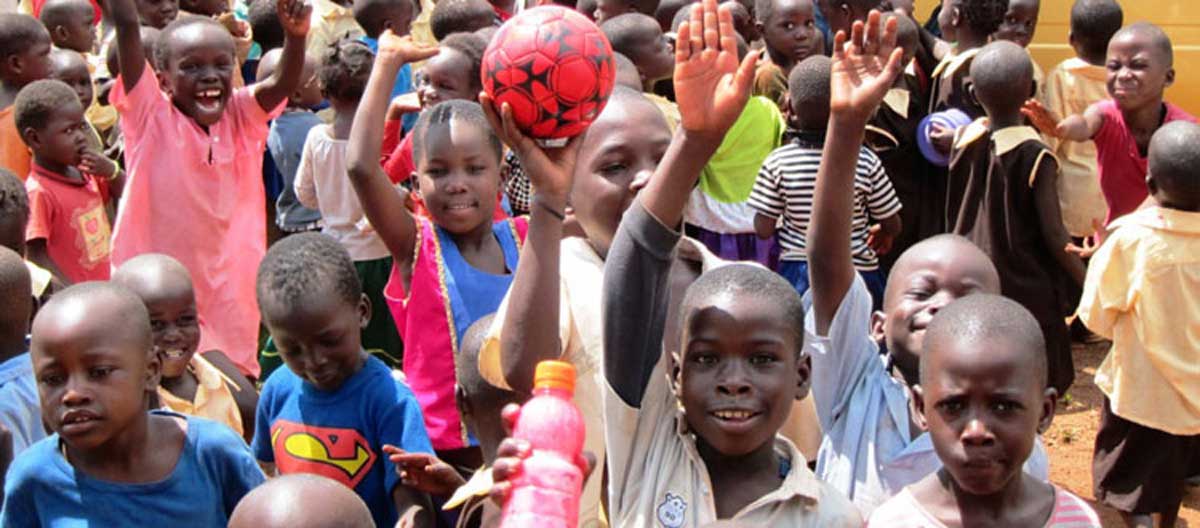Changing Lives in a Ugandan Slum

Significant results and inspirational stories are pouring out of the Sustain for Life funded project in Soweto, a community of some 4,000 displaced individuals near Jinja, Uganda. Through our partners Children on the Edge we are seeing a transformational difference to a marginalised community overwhelmed by poverty – a group of people lacking even basic health and education services that has relied on brewing alcohol as their predominant livelihood. Just over a year ago, the situation in Soweto, a slum facing a high prevalence of HIV, wide-spread malnutrition and alcohol dependency, seemed desperate and hopeless.
Life has improved dramatically for many of the residents of Soweto. Through this programme we now see a thriving child community centre where some 150 of the most vulnerable three to six year olds are receiving pre-primary education and two nutritional meals on a daily basis. Flourishing vegetable gardens have been established and 35 community members are fully taking part in agricultural training and growing their own vegetables to feed their families and also to provide an income. Forty vulnerable youth have been identified and enrolled in vocational training and are due to graduate next month. Through the establishment of the Child Protection Committee and training workshops in Soweto, members of the community have been empowered to take action on their own education, health, and welfare needs through the programme with dramatic results.
Esther*, a single mother who has lived in Soweto for about 10 years, was running a small bar. The drinking places in Soweto are breeding ground for prostitution, violence, and abuse against women and children. As a result of the programme, Esther has abandoned the business of selling alcohol to run a kiosk that sells vegetables that she has grown herself. According to her, the business she is running is much better than owning a bar. Esther can feed her family, has seen that it is profitable to sell vegetables and can raise more money now than she did when she ran a bar. “Can this project continue to empower other women like me? I have peace of mind in my new business of selling vegetables. Formally my customers would get drunk, abusive and sometimes threaten to beat me, I thank God that this project has opened my eyes and is able to support my family”. Esther, like most women involved in the programme, is so grateful for her new knowledge and skills because they have really changed her and her family’s life.
Patience*, a mother of five, has lived in Soweto for 10 years and selling alcohol for five years before joining the programme. She says that the time she has worked with the project has really had an impact on her life and she wishes it had come earlier.”The misery of seeing my children go to bed hungry is gone for now” says Patience who goes to the garden two times a day to make sure she works as hard as she can and improve her livelihood.
Vicky*, a single mother of six children. says “I engaged in brewing for all that long because I had nothing to do and yet I had to feed my family. I am glad to be part of the agri-business programme. I have gained skills and possibly one day when I go back to northern Uganda I will be able to use these skills”.
When four year old Joseph* first came to the Child Community Centre he was in dire need of support. He had been abandoned by his mother and his father was unable to provide food for him due to an accident. Joseph had skin infections all over his body and he continued to fall sick frequently and not show interest in play activities at the centre. The teachers and social workers had several sharing and learning sessions to see how best they could support him. Through nutritional and health interventions plus a little love and care, Joseph’s life has been transformed to the extent that he is now healthy and actively involved in play activities with the other children at the centre.
Seventeen year old Jane* had dropped out of school due to hardship and had nowhere to stay or eat. She joined the vocational training programme to study hairdressing in 2012. As a result Jane was offered a job even before she completed her training. She works as an instructor at a vocational training institute where she earns a good salary. She has become self sustaining and now rents her own house away from the centre. She also runs a small salon and has opened a savings account. Jane is grateful for the programme in Soweto and tells her story with tears coming out of her eyes. She never imagined she would get this far and promises to work even harder to make her life’s dreams comes true.
*names have been changed